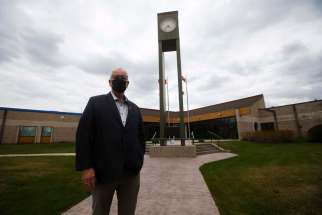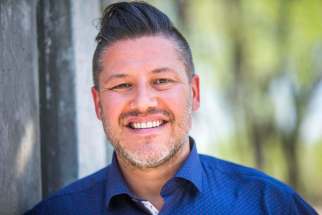The right path Winnipeg Foundation's first Indigenous, two-spirit CEO channels pain of his youth to help build brighter future
Read this article for free:
or
Already have an account? Log in here »
To continue reading, please subscribe:
Monthly Digital Subscription
$0 for the first 4 weeks*
- Enjoy unlimited reading on winnipegfreepress.com
- Read the E-Edition, our digital replica newspaper
- Access News Break, our award-winning app
- Play interactive puzzles
*No charge for 4 weeks then price increases to the regular rate of $19.00 plus GST every four weeks. Offer available to new and qualified returning subscribers only. Cancel any time.
Monthly Digital Subscription
$4.75/week*
- Enjoy unlimited reading on winnipegfreepress.com
- Read the E-Edition, our digital replica newspaper
- Access News Break, our award-winning app
- Play interactive puzzles
*Billed as $19 plus GST every four weeks. Cancel any time.
To continue reading, please subscribe:
Add Free Press access to your Brandon Sun subscription for only an additional
$1 for the first 4 weeks*
*Your next subscription payment will increase by $1.00 and you will be charged $16.99 plus GST for four weeks. After four weeks, your payment will increase to $23.99 plus GST every four weeks.
Read unlimited articles for free today:
or
Already have an account? Log in here »
Hey there, time traveller!
This article was published 18/05/2021 (1666 days ago), so information in it may no longer be current.
There’s a story Sky Bridges likes to share, one that highlights what has become a guiding principle in his life.
The moment of insight came when, at the age of 17, he was engaged in a philosophical discussion with an Indigenous elder he’d been connected with while studying at Red River College.
“The elder said to me, ‘I want you to imagine that you’re sitting in the centre of a teepee,’” recalls Bridges, 43, who on April 27 began his new job as the sixth CEO in the history of the Winnipeg Foundation, replacing Rick Frost, who led the charitable organization for the past 24 years.
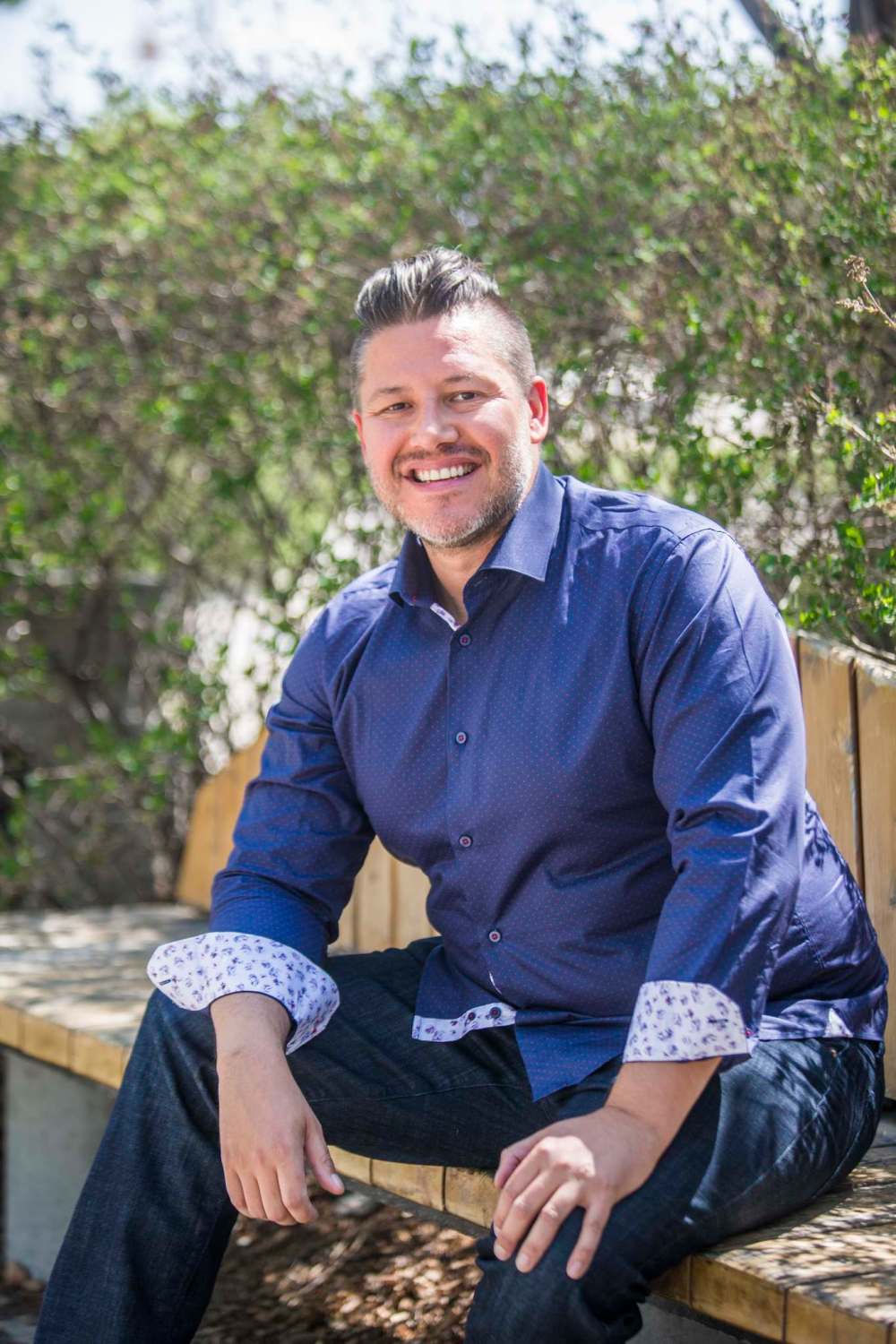
“She (the elder) said, ‘I want you to look at every pole and name a culture, name a belief, name a racial background and keep going around for as long as you can and let me know when you’re done.’
“When I said I’d come up with all the different ones I could, she said, ‘I’d like you to imagine looking up in the centre of that teepee and tell me where all those poles go. They’re all connected, they all come together in the same point.’”
Bridges was profoundly impacted by that lesson: we are all members of the same community and we are stronger when we work together.
“There’s nothing wrong with having different beliefs — you can think a different way than I can think — but at the end of the day we are still connected, we are still one family, we are still one community,” he says. “I want to continue to invite people to be within the circle and recognize that we are part of a community and that through that we become a better Winnipeg.”
A few weeks into his new job, Bridges agreed to sit down with the Free Press for an outdoor interview on the grounds of The Forks at the base of the historic Alloway Arch, built from the facade of a former Main Street bank once owned by William Forbes Alloway, who established the foundation with a $100,000 grant in 1921.
“There’s nothing wrong with having different beliefs– you can think a different way than I can think — but at the end of the day we are still connected, we are still one family, we are still one community.”
– Sky Bridges
Throughout a 60-minute noon-hour chat under a blistering sun and occasionally interrupted by the ear-splitting sounds of screeching trains passing by nearby Union Station, he answered questions, including intensely personal ones, frankly and openly, laughing frequently as he discussed the foundation’s goals for its second century in operation and the challenges he faced growing up as a Métis and two-spirit youth.
Bridges, the former COO of the Aboriginal Peoples Television Network, is making history in his new role. He’s not only the first Indigenous person to lead the Winnipeg Foundation — or any other community foundation in Canada — but the first member of the LGBTTQ+ community to do so.
Métis with Blackfoot and Cree heritage on his mother’s side, he is keenly aware of the significance others place on his being the first Indigenous and gay leader in the history of the foundation.
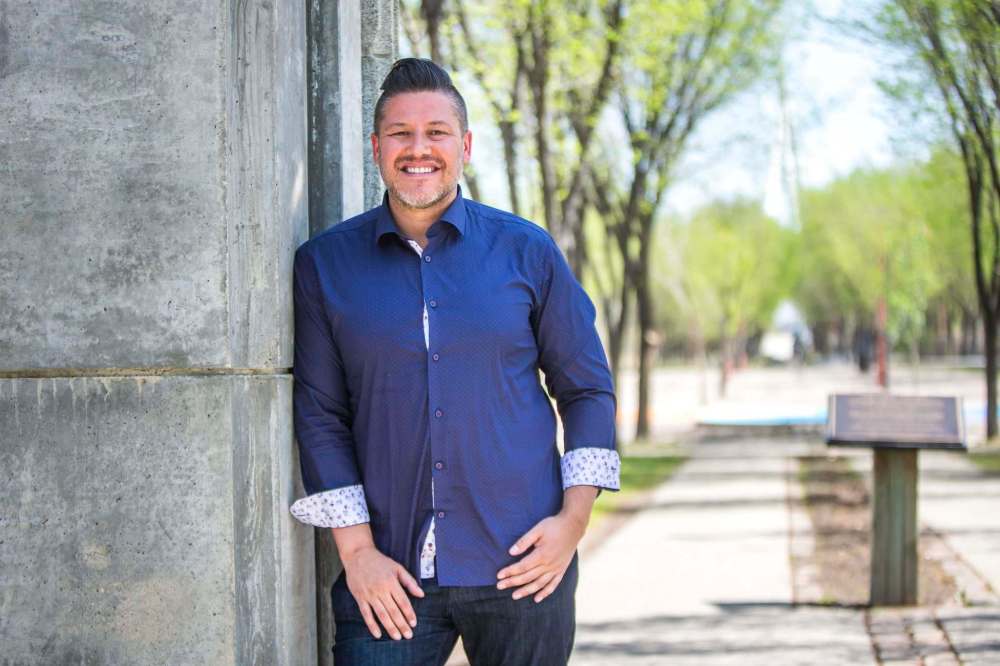
The Winnipeg Foundation operates like a giant endowment fund that pools donations, invests them, then distributes revenue in the form of grants to charitable groups and causes. In 2020, the foundation — Canada’s first community foundation — received more than $187 million in gifts and distributed $73 million in community grants.
“I think it’s significant,” Bridges says of his background. “As I started to grow up and understand the plight of Indigenous people overall and worked for the Canadian Council for Aboriginal Business … I recognized there’s a journey that we’re on, and we’re still on, so certainly for me being the first is a signal about the times that we’re in, that we are still going through healing and opportunity.
The Sky Bridges File
● Age: 43, born Dec. 20, 1977 at the old Women’s Pavilion in Winnipeg. He arrived at 11:11 a.m. “My favourite number is 11, that’s why,” he says. He is the eldest of three brothers.
● Marital status: Single, but “I’m dating someone.”
● Pets: A shepherd-terrier mix from Manitoba Mutts dog rescue named “Henrietta” (“Henry” for short). “I am a dog lover. This is my second dog. Before that, I had a Great Dane and she was a fantastic dog, a gentle giant.”
● What kind of person is he: “I would say that I’m very curious about the world and about people. I’m always thinking about how to make the world a better place than when I came into it. Someone who wants to find the good in every situation. I’m certainly an optimist. There’s a degree of realism, but realism is very subjective.”
● One thing people don’t know: “Well, I am actually introverted … some people think introverted means you can’t be extroverted. I can be extroverted. When I am extroverted or in a crowd it drains me of energy and I need to become introverted to regain my energy. I need time to decompress.”
● Favourite film: Peaceful Warrior, a 2006 Nick Nolte drama about a troubled but talented gymnast who meets a spiritual guide. “It’s based on a book by Dan Millman.”
● Favourite food: “I love all kinds of food. If I had to pick one I had to eat all the time, I’d probably say pasta. Certainly homemade mac and cheese, but I love all types of pasta. I really am a foodie.”
● Favourite music: “I like all types of music. I listen to a lot of EDM (electronic dance music) though … I listen to a lot of podcasts where it’s a mix and a blend of music, everything from house music, chill-out music, that whole electric spectrum.”
● Hobbies and sports: “Before COVID, I was going to Crossfit, working out and going to the gym five days a week, cardio three days a week… Outside of the Crossfit, there’s weightlifting, bike riding, and going to the dog park. I don’t play any other competitive sports.”
● Community service: Passionate about volunteering, he has served on the boards of Winnipeg Folk Festival, United Way Winnipeg, It Gets Better Canada, Travel Manitoba, Manitoba Indigenous Tourism Association, Casera Credit Union, Manitoba 150 and CARAS/MusiCounts.
“For me, it’s a positive story, a positive footnote. I wasn’t given the job because I am Indigenous; I was given the job because of the skill sets I bring. For me I recognize that being visible to other Indigenous youth is a positive sign for them, because quite often what has happened — and even for me when I was younger — I didn’t have symbols or people who were like me in positions of power.”
Asked about becoming a positive role model, he becomes reflective. “It’s not just that I’m Indigenous, but the fact I’m two-spirit,” he says.
Two-spirit was a term created in Winnipeg from a gathering of LGBT and Indigenous people in 1990. In essence, the term means a person contains both the male and female spirits within them.
“There’s another layer to it,” Bridges says. “To say that you are two-spirit also means you follow the belief system of Indigenous culture within that. It’s kind of like you’re practising the spiritual beliefs behind it, you’re walking the Red Road, you believe in spirit, you believe in the cultural understanding of what it means to be two-spirited. It has a spiritual component, not just a gender identification kind of a bend to it.”
Born in Winnipeg in 1977, Bridges pauses briefly when asked about his early years.
“I have a bit of a complicated family history,” he confides, noting that his life changed dramatically at the age of 12 when his mother, an accountant/bookkeeper, moved the family from Winnipeg to Marquette, about 46 kilometres northwest of the city.
It was a huge transition for a child. He went from riding his bike to Kildonan Park and going to 7-Eleven for Slurpees to living in a tiny town, house on a gravel road and taking the bus to school in Warren.
“That part of my life has had a profound effect on who I am. When I was growing up in the North End, there was a lot of Indigenous people. I didn’t even think about it when I was 12. When we moved to Marquette and I started going to school in Warren, suddenly in that classroom I was the darkest kid they had ever seen.
“They didn’t have much diversity. Suddenly, I was picked on for being Indigenous, which I didn’t experience when I was going to (Winnipeg’s) Luxton School because there was just such a diversity of kids. That was the first time it was more in my face that I was different from everyone. It was terrible.
“The kids used to sing ‘one little, two little, three little Indians’ to me. Later on, it transitioned to being bullied over being two-spirit, being called faggot and whatnot. As a kid, especially growing up in the country, I had no positive images of what it meant to be two-spirit… to be picked on when you’re gay it’s done in a way that it’s somehow this sexual perversion, there’s something wrong with you. I always felt as a kid that I was a monster, and felt ashamed for who I was.
“If Indigenous culture was accepted when I was kid, I would have learned that Indigenous people saw two-spirited as people who are gifted, have something special about them and have a contribution. Traditionally, two-spirit people were healers, they were leaders in the community, they were allowed to go into either type of ceremony, male or female, because they had both gender spirits within them. Imagine if that was my influence growing up.”
“For me I recognize that being visible to other Indigenous youth is a positive sign for them, because quite often what has happened– and even for me when I was younger — I didn’t have symbols or people who were like me in positions of power.”
Far from carrying the scars of bullying, those taunts have helped to fuel his ambition to become a community leader and make Winnipeg a more inclusive and compassionate place.
“For me, I hope that the impact I have is that other kids who come after me don’t have to go through what I went through,” Bridges said softly. “As a child, I suffered a lot with depression, and seeing into the future was really hard to do. It was really about trying to get through each month. I just wanted to be happy.”
Along with being bullied as a youth, he has overcome an on-and-off battle with depression, and while attending college discovered he suffers from dyslexia, a learning disorder that affects your ability to read, spell, write, and speak. At one point, his principal at Warren elementary told his mother not to expect Bridges to amount to anything because of his school struggles. It wasn’t until college when his learning style was identified, that he had better insight into how he learns.
After graduating from Red River with diplomas in business administration and international business, and working briefly with Bristol Aerospace, he reached a turning point.
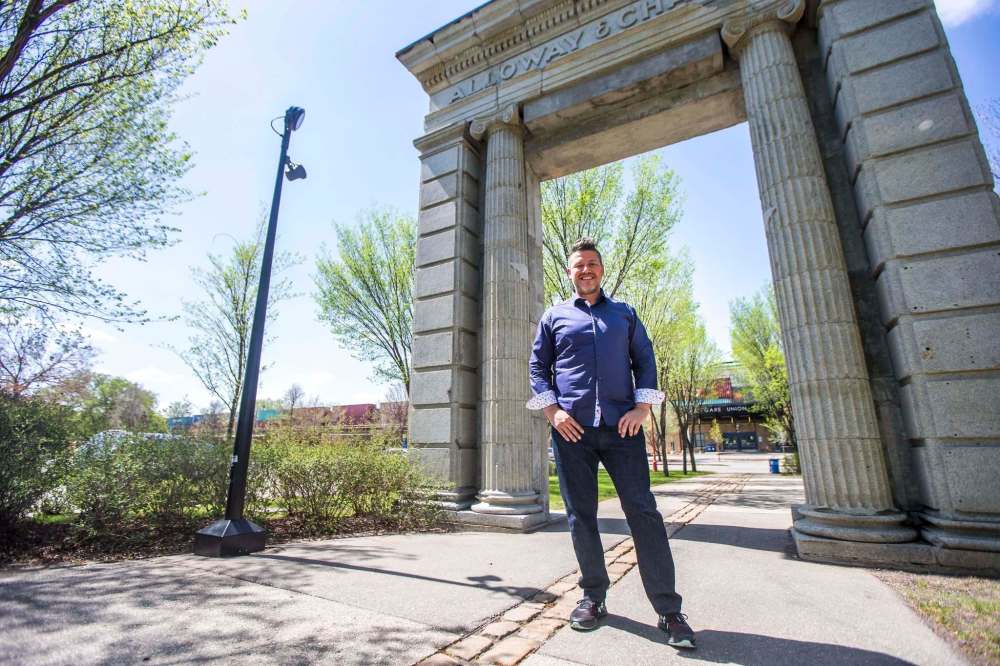
“I kind of came out of the closet to myself and I felt like I couldn’t stay here in Winnipeg. I came out to myself when I was 17, but in 2001 I came out to everyone. I started to say to my friends and family this is who I am, no longer hiding it. It was scary, it felt good. But some people didn’t want to be my friend anymore. And also I felt like I couldn’t stay in Winnipeg and grow.”
Which is how he ended up in Toronto working for PrideVision TV, Canada’s first network targeting LGBTTQ+ viewers. Then it was on to a stint with the Canadian Council for Aboriginal Business.
He never thought he’d come back, but Bridges started to miss Winnipeg after being in Toronto for about five years. He was tiring of the ‘rat race’ and wanted to come home and be part of making Winnipeg a better place.
After working for CBC as a senior communications officer in Winnipeg, he moved on to APTN for 14 years, the last nine of which as chief operating officer.
“The kids used to sing ‘one little, two little, three little Indians’ to me. Later on, it transitioned to being bullied over being two-spirit, being called faggot and whatnot. As a kid, especially growing up in the country, I had no positive images of what it meant to be two-spirit… “
He jumped at the chance to take the helm at the foundation and sees symbolism in the fact his first day on the job, in a remarkable coincidence, was also the first day of the charity’s second century in operation.
“I love coincidences in life, or serendipity, I’m always looking for signs in life I’m on the right path,” he says. “I think that’s absolutely incredible because it’s the start of new thinking. It’s a sign I’m on the right path. When I went into the offices of the foundation (located in the Richardson Building), I noticed when I looked out the window and across the street the Manitoba Metis Federation now is in the Bank of Montreal. For me, seeing that Metis flag it really meant something for me being Metis.”
He doesn’t see himself as charting a new course for the foundation, which is already committed to projects that fight systemic discrimination and promote reconciliation with First Nations peoples.
“We are a 360 granter, we grant in all areas in terms of health, wellness, environment, reconciliation is part of it. We look at ensuring all segments of our community are included. That is my goal, my focus … being constantly aware of where are the gaps in Winnipeg of people who need support … are we whole as a community? Where are the gaps, who’s not included, and let’s include them.”
It all comes back to what the elder taught him many years ago — like the separate poles that come together at the top of a tipi, we are stronger together.
“It’s really about the concept of the circle in that we, all of Winnipeg, are all interconnected and are in the circle together and how do we move together in identifying that we are one community,” Bridges says. “Yes, reconciliation is a going to be a goal of mine, as is supporting all of Winnipeg in moving forward. It’s not one over the other. I think any leader brings a certain perspective because of their lived experience. Mine happens to be because I’m Indigenous and two-spirit. At the end of the day, I’m all about making sure the concept of the foundation is a circle for all, forever.
“I’m in a great place now. I really am. To me, working for the Winnipeg Foundation is like coming home.”
doug.speirs@freepress.mb.ca

Doug has held almost every job at the newspaper — reporter, city editor, night editor, tour guide, hand model — and his colleagues are confident he’ll eventually find something he is good at.
Our newsroom depends on a growing audience of readers to power our journalism. If you are not a paid reader, please consider becoming a subscriber.
Our newsroom depends on its audience of readers to power our journalism. Thank you for your support.
History
Updated on Tuesday, May 18, 2021 8:17 PM CDT: Removes opinion tag

